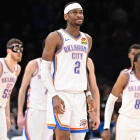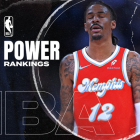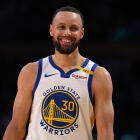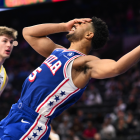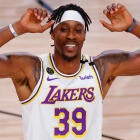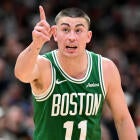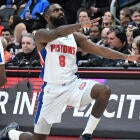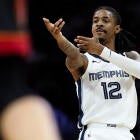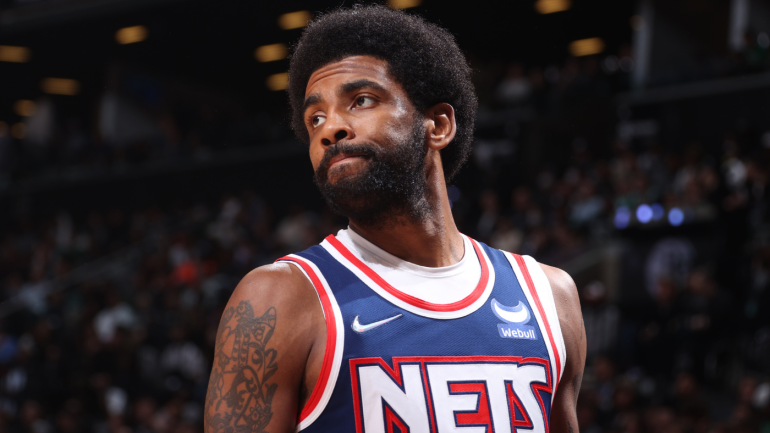
NEW YORK -- The Brooklyn Nets called a timeout in the fourth quarter on Monday, and, rather than hand the ball to the referee, Kevin Durant decided he'd get a shot up. When Grant Williams of the Boston Celtics saw Durant looking at the basket, though, he followed, putting one hand on the superstar's back and the other in his face to contest the potential practice shot. Durant walked past the ref, took a rhythm dribble and released a 19-footer, with Williams on his hip, both arms now raised.
Williams had said last week that, from the Celtics' point of view, "everything has to be tough" for Durant. "Not only just him walking up and down the court, but him trying to just get a cup of water on the sideline." Williams did not want him to see the ball go through the net.
Durant's jumper clanked off the rim. Kevin Garnett would have been proud.
After the Nets' season ended in a sweep, it would be easy to frame this moment as a microcosm of the series. Boston had the best defense in the league in the regular season, a fact that Durant acknowledged at his press conference, and the team entered the first round on a mission to make him uncomfortable: Be as physical as possible, show him a crowd, make him work on defense, wear him down over time. If Durant can't find a rhythm, the thinking goes, then neither can Brooklyn.
The demise of the 2021-22 Nets, though, defies monocausal explanations, as does this bizarre series. Durant shot poorly in the first two games and attempted only 11 shots in the third, but, before Game 4, Celtics coach Ime Udoka said that his struggles would be "fool's gold" if they assumed that their defense was fully responsible for them. Gunslinger that he is, Durant went down firing; with better spacing and deeper post touches, Durant finished with 39 points on 13-for-31 shooting and nine assists in 47 minutes.
Durant said that Boston was the better team. He also noted that Brooklyn shot 50 percent from the field and 42 percent from 3-point range in the series. As amazing as the Celtics' defense may be, the Nets scored 115 points per 100 posssessions in four games, a better mark than all but two teams managed over 82.
"Turnovers, offensive rebounds, straight line drives really killed us," Durant said, following the Nets' 116-112 loss. "Staying in front of their guys. They had bigger guys; we look up and Seth Curry or [Goran] Dragic is boxing out a 7-footer. They're playing hard, but they're just smaller, you know?"
Before the game, coach Steve Nash said the team had discussed "how fine the margins are and how we've done a lot of things well." Brooklyn had lost Game 1 on a buzzer-beater, and it would lose the series by a combined total of 18 points. If there was one thing the Nets needed to do most urgently, it was take care of the ball -- they had turned it over on a league-high 18 percent of their playoff possessions through Game 3, and 32 of the their 51 turnovers were of the live-ball variety, leading to 51 Celtics points, 23 more than Brooklyn had scored after steals.
Nash added, presciently, that "you don't want to just say it's live-ball turnovers because that could be replaced with some other deficiency." With the season on the line, the Nets went the whole first half without grabbing an offensive rebound. They shot 17 for 29 from the free-throw line, most of the misses coming from Nicolas Claxton, who was otherwise superb. One of them, however, came from Curry, and another, with 22 seconds left and the Nets down by two points, from Durant. Boston recovered the rebound, pushed the ball and scored on the break.
"It felt like there was a few stories unfolding," Nash said.
Nash, Dragic, Bruce Brown, Kyrie Irving and Durant passed through the interview room to discuss the series, the season and the future with varying levels of detail. Before Durant chatted with reporters about "The Batman" -- he has seen the film four times; he is a big Robert Pattinson guy -- and the room cleared out, everyone at the podium pointed to second-chance points, turnovers and physicality as factors in Brooklyn's season coming to an end. They all also credited the Celtics, a more complete and more connected team that the Nets wouldn't have faced so early if not for so many things going sideways.
Irving refused to get vaccinated, rejoined the team part-time in January and only played in 29 regular-season games, six at home. Joe Harris appeared in 14 games and had two ankle surgeries. The team had a COVID outbreak, then Durant hurt his knee and James Harden asked for a trade in the middle of a stretch of 17 losses in 20 games. Offseason additions Paul Millsap, DeAndre' Bembry, Jevon Carter and James Johnson were all eventually shown the door. Curry arrived with a nagging ankle injury, and Dragic caught COVID shortly after he signed. Ben Simmons never got on the court.
"The time that I spent here, every day was something different, something tough," Dragic said.
In the end, it was "the totality of it" that proved insurmountable, Nash said. The version of the Nets that took the floor in the playoffs had glaring weaknesses that were almost impossible to mask against championship-caliber competition. "We never wanted to give up on our expectations even though we were under duress," Nash said. "But at the same time, you kind of have to have a realistic view as well of where we were at the end of the year." Down the stretch in Game 3 and for most of Game 4, they tilted their lineups toward offense, playing three of their four small guards -- Irving, Curry, Dragic and Patty Mills -- next to Durant and either Brown or a big man. Nash said that the size disparity "put such a strain on everybody," and suggested that they ran out of gas as a result.
"I felt for 'em," Nash said. "We asked 'em to battle. You could see them trying to hide some facial expressions when we're telling 6-2 guys that you're guarding the center. But our options were limited."
That is not a scenario that Brooklyn's front office or coaching staff envisioned last summer or even after the trade deadline. But last season's what-ifs -- Harden's hamstring, Irving's ankle, Harris' missed 3s, Durant's "big-ass foot" -- seem almost ordinary compared to the confluence of events that led the Nets here. Never mind whether Harden would have requested a trade had Irving gotten vaccinated or Durant and Harris avoided injury; would he have asked out if they'd brought back Jeff Green, Landry Shamet and Timothe Luwawu-Cabarrot to space the floor? Never mind how a healthy Simmons could have transformed the team and unlocked the Durant-at-5 lineup; could Johnson or Bembry have given them a defensive boost against Boston?
To have followed this Brooklyn team at all is to have tossed around hypotheticals big and small that might have changed things. Is there any chance Simmons might have made his debut had the Nets won Game 1 or Game 3? Even if they couldn't have avoided a meeting with the Celtics, they surely would have preferred to delay it -- do they stay in the top six if Blake Griffin's 3-point shooting doesn't fall off a cliff? What if Carter had shot the ball as well as he did in Phoenix when he was in Brooklyn? You know he's making his 3s in Milwaukee, right?
On Monday, Irving said for the first time that he "felt like I was letting the team down at a point where I wasn't able to play," adding that "it became a distraction at times." Separately, he said that the team hadn't had enough time to jell: "It's hard to just turn the switch on and just be like, all right, we're a great team today." He was not wearing a hot-dog costume.
Irving, eligible to sign an extension this offseason, said he's not going anywhere and is excited to continue "managing this franchise" along with Durant, general manager Sean Marks and owner Joe Tsai. Against Boston, he said, it never felt like the Nets had found a lineup that matched up well size-wise and allowed them to play in the flow. "There was a lot of thinking going on out there," he said. "You could tell." More broadly, Irving said that "it was just a heavy lift for us throughout the whole entire season," and that he'll use the early exit as fuel.
"No regrets," Durant said. "I mean, shit happens."
![[object Object] Logo](https://sportshub.cbsistatic.com/i/2020/04/22/e9ceb731-8b3f-4c60-98fe-090ab66a2997/screen-shot-2020-04-22-at-11-04-56-am.png)










